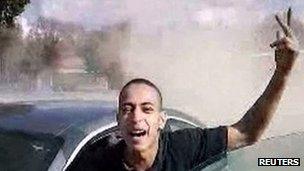Toulouse shootings: Merah's path to murder
- Published

Mohammed Merah was said to have converted to radical Islam while in prison for robbery
For the first time in 36 hours, a popular cafe also used by journalists reporting on the siege in the Cote Pave district of Toulouse has changed TV channels.
Gone is the continuous news programme which transfixed many of the clientele over the past two days.
In its place are continuous music videos. The mood here has changed, normality is starting to return.
But what has happened over the past two weeks will not be forgotten. It's been one of the most traumatic periods in the city's long history.
"I couldn't leave my apartment for two days, I was so scared," said one local resident.
"I'm really relieved it is over," said another. "The police are still here but they are getting back into their cars on my road."
Mohammed Merah, once a petty criminal who liked going to nightclubs and showing off in cars, has left an indelible stain.
From crime to Islam
And the path which led ultimately to the killing spree in which he took the lives of young children, a rabbi and soldiers, has today been revealed in some detail by government officials.
Their information is based on what they call the "confession" made by Merah as police officers negotiated with him during the siege of the apartment building.
He told them his path to radical Islam began in Toulouse five years ago while serving a prison sentence for robbery.
"He said while inside [prison] he became a keen reader of the Koran," Paris prosecutor Francois Molins revealed, "and spoke about his al-Qaeda training in Waziristan [Pakistan]".
Merah travelled to Pakistan and Afghanistan on his own, according to the prosecutor, making it harder to keep him under observation.
On return to France he did not show up on any known militant Islamist network.
The large cache of weapons he obtained for the attack was apparently bought with the proceeds of another robbery.
'Die as a mujahideen'
His violent brand of ideology is revealed in the gruesome video he recorded of the three attacks which began on 11 March.
As he shoots one of three soldiers who were murdered, he apparently says: "You kill my brothers, I kill you."
The "brothers" is presumably a reference to the Taliban in Afghanistan, where French troops make up part of the Nato forces in the country.
Like many militants inspired by the radical ideology of al-Qaeda and other groups, Merah seems to have believed he would be rewarded if he was killed.
He's quoted by police negotiators as saying he wanted "to die as a mujahideen with a weapon in his hands and he would therefore go to paradise. Whereas if it was policemen who were killed, for them it would be too bad."
Merah ended up being shot through the head by a police sniper as he tried to escape from the apartment by jumping out of a window.
He did die with a weapon in his hand - a Colt 45.
As the police commandos moved through the apartment having blown out the windows and door with grenades, he confronted them outside the bathroom where he'd been hiding.
He fired 30 bullets and was still firing as he jumped from the window.
While this bloody episode in the history of Toulouse is now over, many big questions remain.
Did Merah have any accomplices or was he a "lone wolf" of the kind encouraged by al-Qaeda leaders?
Why did the intelligence agencies fail to keep track of him recently when he'd been under observation for several years as a radical Islamist and one with a criminal record?
Is the official explanation for this really credible: that it had been difficult to track him because he'd travelled alone to Pakistan and Afghanistan and had not linked up with other radical networks?
And how will France as a whole respond to what has happened, not least with the presidential election just a month away?